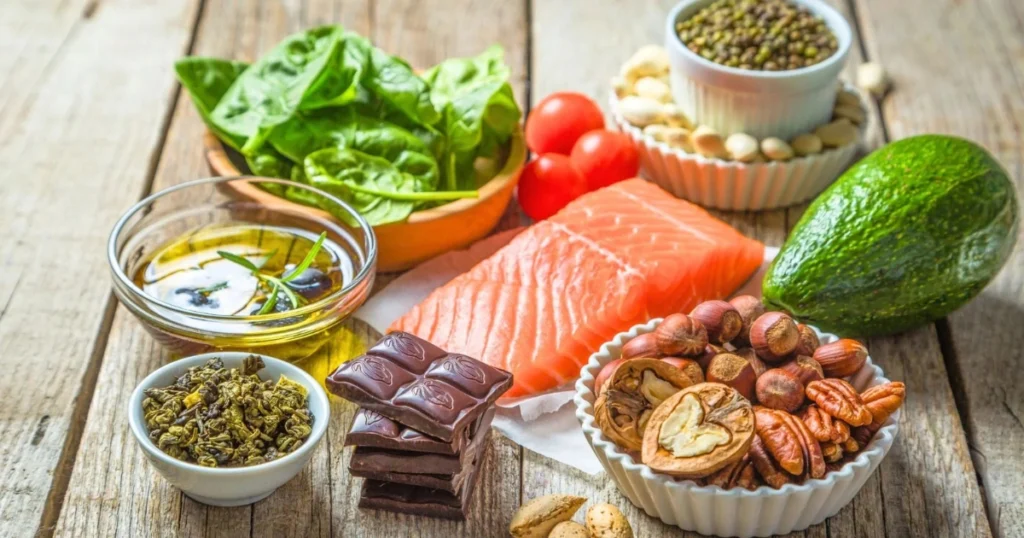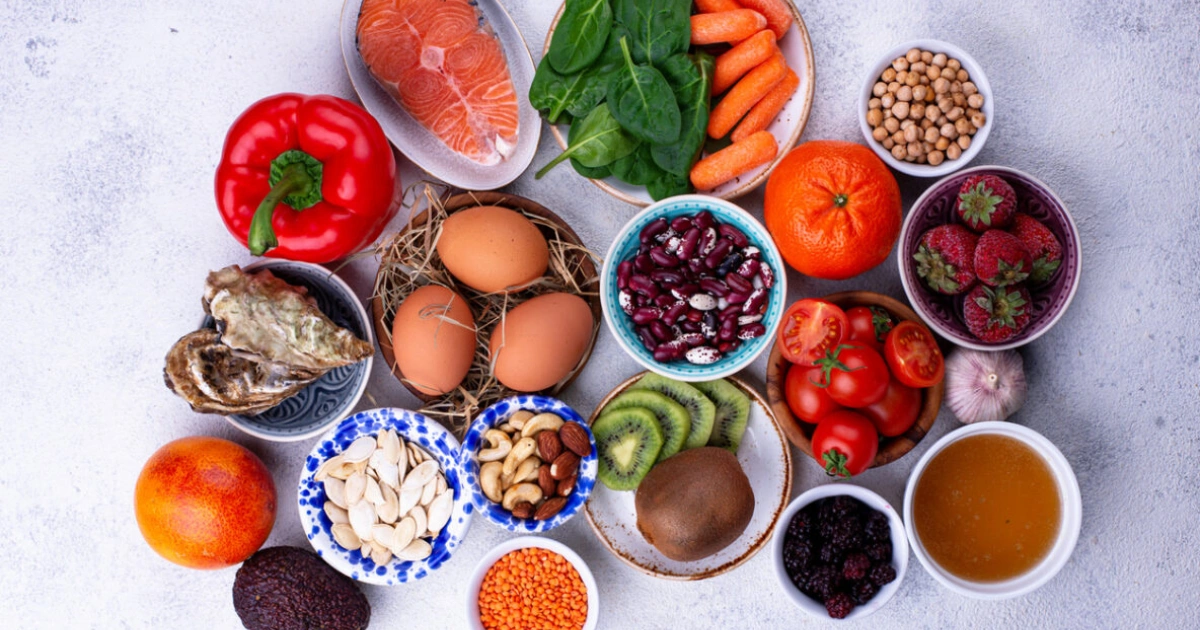Collagen is the most abundant protein in the human body, essential for maintaining skin elasticity, joint flexibility, and overall structural integrity. As we age, our natural collagen production decreases, leading to wrinkles, joint pain, and reduced skin firmness. Fortunately, certain foods can help stimulate and support the body’s collagen synthesis naturally.
This guide explores nutrient-rich ingredients that fuel collagen creation and help you maintain youthful, resilient skin and healthy connective tissue.

Why Collagen Matters for Health and Appearance
Collagen plays a vital role in the body’s connective tissues, including skin, tendons, cartilage, and bones. When collagen levels decline, signs of aging and degeneration become more apparent, such as:
- Wrinkled or sagging skin
- Weakened joints and tendons
- Brittle hair and nails
- Slower wound healing
Consuming the right nutrients can naturally enhance collagen production and prevent premature aging, especially when combined with a balanced diet and healthy lifestyle.
Top Natural Foods That Stimulate Collagen Production
1. Bone Broth
Bone broth is one of the most collagen-rich foods available. When animal bones are simmered for hours, they release gelatin, a form of collagen, along with amino acids like proline, glycine, and glutamine. These compounds are directly involved in repairing tissues and maintaining skin elasticity.
2. Chicken (with Skin)
Chicken is naturally high in collagen, particularly in the skin and connective tissues. Eating cooked chicken with skin provides a direct source of collagen peptides, which can support skin firmness and joint lubrication.
3. Sardines
Whole sardines—including their skin and tiny bones—are packed with calcium, phosphorus, and type I collagen. These nutrients contribute to joint and bone strength and support structural regeneration.
4. Shellfish
Oysters, shrimp, and mussels are rich in copper and zinc, two minerals essential for activating enzymes involved in collagen formation. Shellfish also offer omega-3 fatty acids, which reduce inflammation and protect collagen fibers from breakdown.
5. Organ Meats
Liver, heart, and kidney from grass-fed animals are high in essential nutrients like vitamin A, iron, and copper. These compounds support skin cell regeneration and boost collagen synthesis at a cellular level.
6. Citrus Fruits
Oranges, lemons, limes, and grapefruits are excellent sources of vitamin C, a vital antioxidant that helps convert amino acids into collagen. Without enough vitamin C, your body cannot produce collagen efficiently.
7. Red Bell Peppers
These colorful vegetables are not only rich in vitamin C but also contain capsaicin and antioxidants that protect existing collagen from damage caused by free radicals and environmental stress.
8. Berries
Strawberries, blueberries, and raspberries are loaded with anthocyanins—antioxidants that strengthen collagen fibers and reduce collagen degradation. They also help maintain skin hydration and texture.
9. Leafy Greens
Spinach, kale, and Swiss chard contain chlorophyll, which has been linked to increased procollagen levels in the skin. These greens also provide magnesium and antioxidants that protect the skin barrier.
10. Collagen Supplements
While food is the ideal source, high-quality collagen hydrolysate or collagen peptides supplements can help reinforce the skin’s structure and elasticity. Look for supplements with added vitamin C or hyaluronic acid for maximum effect.
11. Cashews
Cashews are a good plant-based source of copper, which is necessary for cross-linking collagen fibers, making them stronger and more stable. They also contain healthy fats and amino acids for skin repair.
12. Legumes
Beans, lentils, and chickpeas offer plant protein, zinc, and other minerals that promote collagen formation and aid tissue regeneration. They’re also fiber-rich and support gut health, which is crucial for nutrient absorption.
Simple Tips to Support Collagen Naturally
- Avoid smoking and excessive sun exposure, which degrade collagen.
- Stay hydrated to keep skin plump and elastic.
- Incorporate a variety of nutrient-dense foods daily.
- Use sunscreen to prevent collagen loss from UV damage.
- Add bone broth or collagen-rich foods to soups, stews, and smoothies.
FAQ: Collagen and Diet
How can I increase collagen naturally through food?
Focus on foods high in vitamin C, amino acids, zinc, and copper. Bone broth, berries, citrus, and leafy greens are particularly effective.
Do collagen supplements work as well as food sources?
Collagen supplements can be beneficial, especially hydrolyzed forms. However, whole foods provide additional nutrients that support overall health and collagen maintenance.
Can I get enough collagen on a plant-based diet?
While plants don’t contain collagen, they offer nutrients like vitamin C, zinc, and antioxidants that support the body’s natural collagen production. Pairing legumes, nuts, and greens can be effective.
Is collagen important only for skin?
No. Collagen is critical for joints, bones, blood vessels, and organs. It’s essential for overall structural support and mobility.
What age should I start focusing on collagen?
Collagen production begins to slow in the mid-20s, so it’s beneficial to support it early with diet and healthy lifestyle choices.
Internal Link Suggestions from secretsofthegreengarden.com
- Best Foods for Radiant Skin Naturally
- Anti-Aging Garden Herbs You Can Grow at Home
- Natural Ways to Improve Joint Health
External Link Suggestions
- Harvard Health Publishing – The Nutrition Source
- NIH – Collagen and Skin Aging
- Cleveland Clinic – What to Eat for Healthy Skin
Conclusion
Nourishing your body with collagen-friendly foods is a powerful way to enhance skin appearance, joint flexibility, and overall vitality. By consistently incorporating natural sources like bone broth, citrus fruits, berries, leafy greens, and healthy proteins, you can support collagen production from within—without relying on synthetic solutions. Your skin, bones, and connective tissue will thank you for the care you give them today.


Such a simple yet powerful message. Thanks for this.
Very useful tips! I’m excited to implement them soon.
пмж кипра для россиян 2025
Постоянное место жительства в Кипре стало актуальным вопросом для многих людей. Получение ПМЖ включает в себя множество нюансов, которые стоит учитывать.
Прежде чем подавать заявку на ПМЖ, полезно ознакомиться с основными условиями. Ключевыми требованиями являются наличие стабильного источника дохода, медицинская справка и отсутствие судимостей.
После того как все необходимые документы собраны, следует подать заявление на рассмотрение. Процесс рассмотрения заявки может занять несколько месяцев, поэтому важно быть в курсе ее статуса.
Если ваша заявка будет одобрена, вы станете обладателем статуса ПМЖ. Теперь у вас будут все преимущества, доступные для постоянных жителей.
This is one of the best explanations I’ve read on this topic.
где купить настоящий аттестат за 11 класс где купить настоящий аттестат за 11 класс .
I love how clearly you explained everything. Thanks for this.
купить легально диплом купить легально диплом .
Thanks for taking the time to break this down step-by-step.
Your articles always leave me thinking.
I hadn’t considered this angle before. It’s refreshing!
старые проститутки в калуге индивидуалки калуги досуг
I never thought about it that way before. Great insight!
купить аттестаты за 11 вечерней школе в омске купить аттестаты за 11 вечерней школе в омске .
I appreciate the honesty and openness in your writing.
купить аттестат 11 класса купить аттестат 11 класса .
You always deliver high-quality information. Thanks again!
I enjoyed your perspective on this topic. Looking forward to more content.
Luxury property expertise, exactly what discerning clients need. Setting the luxury standard. Premium service premium results.
Dry Cleaning in New York city by Sparkly Maid NYC
**mindvault**
mindvault is a premium cognitive support formula created for adults 45+. It’s thoughtfully designed to help maintain clear thinking
casino download
References:
https://gitlab.oc3.ru/u/carmelo836027
برای دوستانی که به دنبال یک راهکار مطمئن برای وریفای حساب در بروکرهای فارکس هستند، پیشنهاد میکنم خدمات شوپی را بررسی کنند. این مجموعه به صورت تخصصی، وریفای قانونی حساب های فارکس را با مدارکی ارائه میدهد که کاملاً معتبر بوده و به نام خودتان صادر میشود. این روش دائمی است و ریسک بلاک شدن حساب شما را به صفر میرساند. کیفیت و پشتیبانیشان واقعاً عالی است.
Ein kostengünstiges Hobby, das viel bietet, solange man bereit ist, Zeit und
Geduld in die Grundlagen zu investieren. Ein erfolgreiches Pokerspiel setzt nicht nur ein gewisses Maß an Kartenwissen voraus,
sondern auch in Bezug auf Bankroll-Management gute Kontrolle.
Anders als bei anderen Glücksspielarten können die Spieler bei Poker mit strategischem Denken und psychologischer Finesse das Ergebnis zu ihren Gunsten beeinflussen. Poker
ist ein beliebtes Spiel, das von vielen Menschen auf der ganzen Welt gespielt wird.
Casino Guru Slots sind sehr beliebt, weil sie sowohl
klassische als auch moderne Varianten abdecken und für jeden Spielertyp etwas
bieten.
Ja, Casino Guru ist eine lizenzierte und seriöse Plattform für Online-Glücksspiele.
Spielerbewertungen und Forenbeiträge auf Casino Guru bieten authentische Einblicke in den Casino-Alltag – direkt aus der Perspektive der Nutzer.
Zahlreiche Organisationen bieten Beratung und Unterstützung an, auch online oder telefonisch.
Damit Spieler dabei nicht den Überblick verlieren, bietet der online Casino Guru Bonus-Vergleich eine verlässliche Orientierung.
Sie reichen von Willkommenspaketen über Freispiele bis hin zu Cashback-Aktionen und
regelmäßigen Reload-Angeboten. Bonusangebote sind
ein zentraler Bestandteil des Online-Glücksspiels und bieten Spielern die Möglichkeit,
mehr aus ihrem Einsatz herauszuholen. Anreize für das Schreiben von Bewertungen anzubieten oder selektiv
zur Bewertungsabgabe einzuladen, kann den TrustScore verfälschen.
References:
https://online-spielhallen.de/beste-paypal-casinos-2025-top-anbieter-einzahlen/
https://t.me/s/dragon_money_mani/15
مشکل اصلی بکلینکهای وبلاگی اینه که گاهی ایندکس نمیشن، اما چون این پکیج به صورت پست/رپورتاژ هست و متن داره، گوگل خیلی سریعتر شناساییش میکنه. وقتی ۵۰ تا صفحه جدید توی وب ایجاد بشه که همگی به شما اشاره میکنن، رباتهای گوگل به سمت سایتتون سرازیر میشن. برای افزایش سرعت ایندکس و رتبه، تاثیر خرید بک لینک وبلاگی با ایندکس بالا رو نادیده نگیرید.